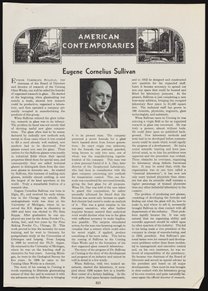Oral history interview with J. Franklin Hyde
- 1986-Apr-30
Oral history interview with J. Franklin Hyde
- 1986-Apr-30
In this interview Franklin Hyde briefly tells of his childhood and his schooling in Solvay, New York. At Syracuse University, Hyde majored in chemistry and continued on to a master's degree. It was during this period under the influence of Reginald Boehner that Hyde became an organic chemist and he continued with that speciality with Roger Adams at Illinois and then with Conant at Harvard. He recalls both his colleagues and the faculty at Urbana and at Cambridge. Despite an offer to join Carothers at Du Pont, Hyde chose to accept the challenge of a position with Corning Glass works, where he was the lone organic chemist. At Corning, Hyde started his studies of organosilicon compounds and where he entered the growing field of polymer chemistry. During the interview Franklin Hyde summarizes several of his research endeavors that contributed to the present day importance of silicones. Included in this section of the interview are instances of the critical role of newly introduced materials to the scientific contribution to World War II. Hyde also describes the chronology of the competition between Corning and General Electric that eventually led to a major patent interference suit. The interview ends with a survey of Hyde's later work with Dow Corning and his reflections on laboratory research and scientific management.
| Property | Value |
|---|---|
| Interviewee | |
| Interviewer | |
| Place of interview | |
| Format | |
| Genre | |
| Extent |
|
| Language | |
| Subject | |
| Rights | Creative Commons Attribution-NonCommercial-NoDerivatives 4.0 International License |
| Rights holder |
|
| Credit line |
|
About the Interviewer
James J. Bohning was professor emeritus of chemistry at Wilkes University, where he had been a faculty member from 1959 to 1990. He served there as chemistry department chair from 1970 to 1986 and environmental science department chair from 1987 to 1990. Bohning was chair of the American Chemical Society’s Division of the History of Chemistry in 1986; he received the division’s Outstanding Paper Award in 1989 and presented more than forty papers at national meetings of the society. Bohning was on the advisory committee of the society’s National Historic Chemical Landmarks Program from its inception in 1992 through 2001 and is currently a consultant to the committee. He developed the oral history program of the Chemical Heritage Foundation, and he was CHF’s director of oral history from 1990 to 1995. From 1995 to 1998, Bohning was a science writer for the News Service group of the American Chemical Society. In May 2005, he received the Joseph Priestley Service Award from the Susquehanna Valley Section of the American Chemical Society. Bohning passed away in September 2011.
Institutional location
| Department | |
|---|---|
| Collection | |
| Oral history number | 0026 |
Related Items
Interviewee biographical information
| Born |
|
|---|---|
| Died |
|
Education
| Year | Institution | Degree | Discipline |
|---|---|---|---|
| 1923 | Syracuse University | AB | Chemistry |
| 1925 | Syracuse University | MA | Chemistry |
| 1928 | University of Illinois at Chicago | PhD | Organic Chemistry |
Professional Experience
Harvard University
- 1928 to 1930 Postdoctoral Fellow
Corning Glass Works
- 1930 to 1938 Research Chemist
- 1938 to 1951 Manager, Organic Laboratory
Dow Corning Corporation
- 1951 to 1975
Honors
| Year(s) | Award |
|---|---|
| 1963 | Distinguished Achievement Award, Dow Corning Corporation |
| 1963 | Honorary DSc, Syracuse University |
| 1963 | Outstanding Inventor Citation, Michigan Patent Law Association |
| 1971 | Whitehead Memorial Lecturer, Engineering Section, National Research Council |
| 1971 | Perkin Medal, Society of Chemical Industry (American Section) |
| 1974 | Midgley Award, Detroit Section, American Chemical Society |
| 1975 | Honorary DSc, Michigan State University |
| 1979 | Elected to Plastics Hall of Fame, Society of the Plastics Industry |
| 1980 | Silicone Pioneer Award, Dow Corning Corporation |
| 1982 | Five of Genius Award, Saginaw Valley Patent Law Association |
Cite as
See our FAQ page to learn how to cite an oral history.
Complete transcript of interview
hyde_jf_0026_FULL.pdf
The published version of the transcript may diverge from the interview audio due to edits to the transcript made by staff of the Center for Oral History, often at the request of the interviewee, during the transcript review process.









